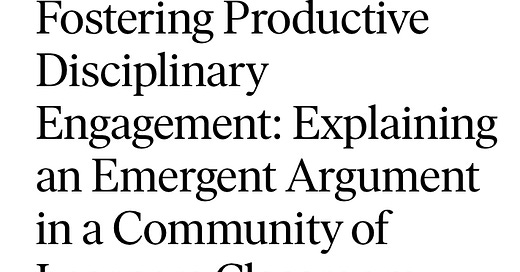Sharing Epistemic Authority Among Experts and Learners
Teachers are authoritative figures in classrooms. They control physical space and movement; they set agendas, make assignments, evaluate effort, and bear responsibility for the safety of children. In the eyes of learners, intellectual authority also rests with the teacher.
What teachers decide to do with that authority is constrained somewhat by workplace agreements and community norms, traditions, and expectations, of course. But how the teacher’s authority plays out in learning scenarios is shaped by the teacher’s answer to two questions: Who are these learners in front of me as knowledge makers? Who do I want them to become in the future?
Whether a teacher decides to retain intellectual authority or negotiate with students is important in shaping pedagogy. If I as teacher believe that my job is to transfer what I know to my students, I invoke an authoritative stance.
If I believe my job is to stimulate my students to construct their own knowledge, and in the process invite them to become confident knowledge constructors, I negotiate authority.
***
Depending on the teacher’s routines and practices, a possible answer to ‘who is this learner as reader and writer’ is “It doesn’t really matter all that much because my instructional goal is reading fluency—or writing argumentative essays.”
Of course, differentiated instruction to accommodate different levels of readiness, attention to academic language, etc., occurs depending on IEPs, second languages, and the like. But these issues are not relevant to authority. The factory metaphor fossilized in our public school system has regularized such a view. In some cases, it is a luxury for teachers to be positioned to even ask questions about learner motives.
Quantitative research on teaching on a large scale typically looks for instructional strategies that are measurably effective when learners are stripped of their history and culture, using the statistical technique of regression analysis to explain nested variance after the experiment, or stratified sampling of a population before the experiment.
Measures of learning outcomes attributable to the treatment are compared to measures of the control group after the treatment for statistical significance. History and identity of learners are not examined nor considered as causes of the outcome; instead, their impact is explained methodologically vis a vis stratified sampling or regression analysis.
The concern of such research is squarely on what and how well the child improves on the knowledge or performance measure following treatment rather than on how adjustments to the learning environment, including epistemological authority relationships, facilitated that learning.
The Science of Reading would argue that learning outcomes aren’t related to a learner’s personal history or identity, but to neurological circuits in the brain activated when prompted by certain stimuli. This separation of the brain and the body has produced pedagogical prescriptions that by design ignore historicity and identity.
Why would a teacher need to know anything about the learner’s history and identity if the lesson unfolds the same way with or without such knowledge? What difference does it make to a teacher if the learner feels valued and confident, motivated to think independently, if the important outcome, accuracy and fluency, is accomplished?
***
The second question, “Who is this learner to become in the future?” is absurd under the view that the teacher is the intellectual authority responsible for delivering pedagogy with fidelity to a script. The conventional wisdom is that the learner should in a short time become a completer who has met the outcomes of the course or grade level as demonstrated by formative and summative assessments.
But what if the teacher takes up the “Who” of the question seriously? What if the teacher wants to deepen the interests, clarify ambitions, strengthen the capacity to ask questions, to use language as a tool of thought and communication, out of a pedagogical motive to impact not just the knowledge of the learner, but also the learner’s epistemic confidence and perceptions of intellectual authority? What if the desired outcome is to move the child forward on the journey to self-actualization?
Imagine teaching to a learning outcome that goes something like this: “Learners will improve self-perceptions of their intellectual authority while building expertise in a topic, area, or capacity of choice related to the course syllabus.”
Children can be intellectual authorities1 with expertise; they can become authorities acknowledged by peers and teacher. They can organize and regulate their activity and search for new ideas about topics or themes of personal interest, share those ideas with peers who can reciprocate, author documents to communicate those ideas, contribute their ideas to learning projects of others, borrow ideas and extend them, reject them, transform them.
Distributed pockets of growing expertise in areas of the course syllabus or thematic unit based on pre-existing or newly forming interests can be fostered through sharing epistemic authority with students and integrating student-driven classroom activities orchestrated by a professional teacher around a syllabus.
***
To repeat, the outcome stipulates as follows: “Learners will improve self-perceptions of their intellectual authority while building expertise in a topic, area, or capacity related to the course syllabus.”
To assess this outcome, teachers would use not just institutionally authorized tests and assessments to serve external accountability, formative and summative, but student reflections, peer testimonies, observations, conferences, and self-assessments.
There would be no need for a performance task, a writing prompt, or a rubric. There would be no “top score.” There would be no need to compare students. The concrete details of accomplishment would be personal, not categorical nor generic. The accomplishment would be owned by the student, for whom the school exists, not by the teacher or the school.



